-

新人教版高中英语必修3Unit 4 Space Exploration-Reading for Writing教学设计二
⑦在我看来, 探索太空是值得的。As far as I am concerned, it is worthwhile to explore the space.Step 10 Writing---draftRecently, students in our class have had heated a discussion on whether space is worth exploring. Students hold different ideas about it.30% of us think space exploration is not worthwhile. They think space is too far away from us and our daily life and is a waste of money. And the money spent on space exploration can be used to solve the earth’s problems such as starvation and pollution.On the other hand,70% think space is worth exploring because we have benefited a lot from it,such as using satellites for communication and weather forecast. What’s more,with further space research,we may solve the population problem by moving to other planets one day. Also,space research will enable us to find new sources to solve the problem of energy shortages on the earth.As far as I am concerned, it is worthwhile to explore the space. Not only can it promote the development of society but also enrich our life. Step 11 Pair workExchange drafts with a partner. Use this checklist to help your partner revise his/her draft.1.Does the writer explain why he/she changed/wanted to change?2.Does the writer tell how the changes have improved or will improve his/her life?3.Is the text well-organised?4.Does the writer use words and expressions to show similarities and differences?5.Are there any grammar or spelling errors?6.Does the writer use correct punctuation?

新人教版高中英语必修3Unit 5 The value of money-Reading and Thinking教学设计二
? Could you offer me some kind of work here?? I don’t want your charity, I just want an honest job.? Careless: I landed in Britain by accident.Step 7:Consolidation.? Find Henry? Roderick and Oliver were I .making a bet when they saw Henry, a poor young man. ? Know Henry? About a month ago, Henry was sailing and later he found himself carried out to sea by a strong wind. Fortunately, he 2.was spotted by a ship. And it was the ship that brought him to 3.England? Offer money to Henry ? Oliver and Roderick gave Henry a letter and told him that there was money in it. They 4.persuaded him to accept it, and made him 5.promise that it wouldn't be opened until 2 o'clock.Step 8:Language pointsa large amount of: a large quantity of; a great deal ofe.g. They bought a large amount of furniture before they moved their new house.make a bet: make an arrangement to risk money, etc. on an event of which the result is doubtful.e.g. We made a bet on the result of the match.permit sb to do something: allow somebody to do somethinge.g. My mother doesn’t permit me to ride in the street after it rained.by accident: as a result of chancee.g. I only found it by accident.stare at: look at somebody or something with the eyes wide open in a fixed gaze( in astonishment, wonder, fear, etc)to be honest: to tell you the truth; to be franke.g. To be honest, I don’t think we have a chance of winning.Step7 Homework:What do you think will happen to Henry? Will the bank-note help him or get him into trouble?

新人教版高中英语必修3Unit 5 The Value of Money-Reading and Thinking教学设计一
Everybody wants to get wealth.In today’s material world,making money or becoming wealthy symbolizes a person’s success and capability. Many people just make every effort, pay any price to attain greater wealth. With money,they can buy nice, large apartments in nice neighborhood. With money they can own luxurious cars. Wealth seems to bring all happiness in life.But is wealth the only road to happiness? Not really. There are many things in the world, which are beyond the means of money, such as friendship, love, health and knowledge. People are so preoccupied with struggling for money that they have no time or would not take the time to form or maintain friendship. What happiness can they feel living as lonely miserable creatures without love or friends in the world even if they accumulate tremendous wealth?In my opinion, people can’t do anything without money, but money is not everything. What money will bring you depends on your personal belief and goal in life. If you are kind enough to help others, especially the poor, money is a good thing to you. With it, you can do much more for the benefit of people and your country, and it will add to your own happiness. If you want money just for your own needs, you’ll never be satisfied or happy. In a word,you should have money spent for more people. Only then can money be the source of your happiness.Step 8 Homework4 students in a group, one acts Roderick, one Oliver, one servant and the fourth one acts Henry Adams, then listen to the tape, pay more attention to the difference between American English and British English in pronunciation, stress, tone.

新人教版高中英语必修3Unit 5 the value of money-Reading For Writing教学设计一
【参考范文】Narrator:(Henry is smiling as he leaves the restaurant. As he is walking down the street, he sees a sign for a place that cuts hair. He decides to get it cut. )H=Henry;B=Barber;R=rude manH:Good afternoon, I'd like to get a cut, if I may. (The barber looks at Henry's hair and continues cutting another man's hair. )Er, I'd really like a haircut. As you can see it's much too long. B:(in a rude manner) Yes, I can see that. Indeed, I can. H:Fine, well I'll have a seat then. (He sits in one of the barber's chairs. The barber turns to look at Henry. )B:It's quite expensive here, you know!Are you sure you can afford it?H:Yes. I think so. (In comes the rude man. )R:Hey you there. I need a haircut quickly. Can you do me straightaway?B:All right, then, get in the chair and I'll see what I can do. R:Thank you. (sits down in one of the barber's chairs)H:Excuse me, but I was here first. Aren't you going to do my hair first?B:This man's in a hurry. H:Well so am I!I insist that you cut my hair first. B:OK, but I'll have to be quick. This gentleman is waiting. H:Thank you. (They both become quiet. After his hair is cut, the barber tells Henry how much he must pay. Henry shows the barber the bank note. )B:Why, Mr . . . (looks shocked)H:Adams. Henry Adams. I'm sorry, I don't have any change. R:You're that Mr Adams! Well,I'm glad I waited or I might never have known it was you. B:Why, Mr Adams, please don't worry!(wearing a big smile) Nothing to worry about!Nothing at all!Please come back any time, even if you only need too little hairs cut!It will be my honour to serve you!

新人教版高中英语必修3Unit 1 Festivals and Celebrations-Listening &Speaking&Talking教学设计
The theme of this section is “Talk about festival activities and festival experiences”.Festival and holiday is a relaxing and interesting topic for students. This part talks about the topic from the daily life of students’. In the part A ---Listening and Speaking, there are three conversations among different speakers from three countries(Japan, Rio and China), where the speakers are participating in or going to participate in the festivals and celebrations. So listening for the relationship among them is a fundamental task. Actually, with the globalization and more international communication, it is normal for Chinese or foreigners to witness different festivals and celebrations in or out of China. In the Conversation 1, a foreign reporter is interviewing a Japanese young girl who just had participated in the ceremony of the Coming-of-Age Day on the street and asking her feeling about the ceremony and the afterwards activities. Conversation 2, Chinese girl Li Mei is witnessing the Rio Carnival for the first time, and her friend Carla gives her some advice on the costumes which enables her to match with the carnival to have a good time. Conversation 3, a Chinese guide is showing a group of foreign visitors around the Lantern Festival and introducing the customs of the festival to them. The three conversations have a strong vitality and insert the festival and cultural elements from different countries. So perceiving the festivals and cultures from different countries is the second task. At the same time, the scripts also insert the targeted grammar --- v-ing as attributive and predicative, which students can perceive and experience in a real context and make a road for the further study. That is the third task. In the Part B--- Listening and Talking, the theme is “Talk about festival experience”, which is the common topic in our daily conversations. During the conversation, Song Lin, a Chinese student, asked Canadian friend Max about how to spend Christmas. In the conversation, Song Lin talked about experience and the feelings during the Chinese Spring Festival, during which there are not only some enjoyable things but some unpleasant things. After the listening, perhaps students find there are some similarities between Christmas and the Chinese Spring Festival as there are some differences in the origins and celebrations. For example, people always visit friends and relatives, decorate their houses, have a big dinner together, chat and give presents to each other.

新人教版高中英语必修3Unit 3 Diverse Cultures-Discovering Useful Structure教学设计
Step 4 PracticeRead the conversation. Find out which words have been left out.Justin: Linlin, I’m going to Guizhou Province next month. I’m super excited! Any recommendations for places to visit?Linlin: Wow, cool! Guizhou is a province with a lot of cultural diversity. Places to visit...well, definitely the Huangguoshu Waterfall first.Justin: What’s special about the waterfall?Linlin: Well, have you ever heard of the Chinese novel Journey to the West ?Justin: Yes, I have. Why ?Linlin: In the back of the waterfall, you will find a cave, which is the home of the Monkey King.Justin: Really? Cool! I’ll definitely check it out.Linlin:And I strongly recommend the ethnic minority villages. You’ll find Chinese culture is much more diverse than you thought.Justin:Sounds great, thanks.Answers:Justin: Linlin, I’m going to Guizhou Province next month. I’m super excited! Do you have any recommendations for places to visit?Linlin: Wow, that’s cool! Guizhou is a province with a lot of cultural diversity. What are some places to visit in Guizhou ? Well, definitely the Huangguoshu Waterfall is the first place to visit in Guizhou Province.Justin: What’s special about the waterfall?Linlin: Well, have you ever heard of the Chinese novel Journey to the West ?Justin: Yes, I have heard of the Chinese novel Journey to the West . Why do you ask if I have heard of the Chinese novel Journey to the West?Linlin: In the back of the waterfall, you will find a cave, which is the home of the Monkey King from Journey to the West.Justin: That’s really true? It’s Cool! I’ll definitely check it out.Linlin:And I strongly recommend the ethnic minority villages on your trip to Guizhou Province. You’ll find Chinese culture is much more diverse than you thought it was.Justin:This all sounds great, thanks.

新人教版高中英语必修3Unit 3 Diverse Cultures-Reading for Writing教学设计
The topic of this part is “Describe a place with distinctive cultural identity”.This section focuses on Chinese culture by introducing Chinatown, whose purpose is to show the relationship between the Chinese culture and American culture. The Chinese culture in Chinatown is an important part of American culture. Chinatown is an important window of spreading Chinese culture and the spirit homeland of oversea Chinese, where foreigners can experience Chinese culture by themselves.Concretely, the title is “Welcome to Chinatown!”, from which we can know that the article aims at introducing Chinatown. The author used the “Introduction--Body Paragraph--Conclusion” to describe the people, language, architecture, business, famous food and drinks and people’s activities, which can be a centre for Chinese culture and shows its unique charm.1. Read quickly to get main idea; read carefully to get the detailed information.2. Learn the characteristics of writing and language.3. Learn to introduce your own town according to the text.4. Learn to correct others’ writing.1. Learn the characteristics of writing and language.2. Learn to introduce your own town according to the text.Step 1 Lead in ---Small talkIn the reading part, we mentioned the Chinatown of San Francisco. How much do you know about Chinatown of San Francisco ?Chinatown is a main living place for Chinese immigrants, where you can see many Chinese-style buildings, costumes, operas, restaurants, music and even hear Chinese.Step 2 Before reading ---Predict the contentWhat is the writer’s purpose of writing this text ? How do you know ?From the title(Welcome to Chinatown) and some key words from the text(tourist, visit, visitors, experience), we can know the purpose of the text is to introduce Chinatown and show the relationship between Chinese culture and American culture.

新人教版高中英语必修3Unit 5 The Value of Money-Listening &Speaking教学设计
Step 4: Listen again and decide if the following statements are true (T) or false (F).1 It was the first time Chen Liyan's story was reported. T口 F口2 Chen found 10,000 yuan in a small plastic bag in Taiyuan railway station口 F口3 Wang Zheng apologized to Chen because he couldn't offer her more money. T口 F口4 Chen took out a large loan to cure her daughter, T口 F口5 Wang set up a fundraising website for Chen's daughter after Chen told him about her situation. T口 F口Step 5:After listening, discuss the questions.1 What kind of person do you think Chen Liyan is?Chen Liyan is generous and honest because she returned a large sum of money to the owner.2 Did Chen return the money because she didn't need it?No. She returned the money because it was the right thing to do. Evidence for this is that she refused to accept the reward money because she felt that it had not been earned. 3 Is it common for people to do what Chen did?It depends on the culture. In some countries it is quite common to return money that has been found. In other countries, people believe "Finders are keepers!" 4 How did Wang Zheng feel about the return of his money?He must have been very happy and relieved to have gotten his money back. We know this because he thanked Chen repeatedly and even offered her a reward.5 Why did Ma Dongbao tell Wang about Chen's family?He must have had great sympathy for Chen and her daughter and wanted to help them.'We know this because he arranged help for them. 6 How did the news reporter feel about Chen's actions?The news reporter felt that it showed that money wasn't the most important thing in life. We know this because the reporter told us that this is what Chen believes. and then said, “that's a great attitude to take."
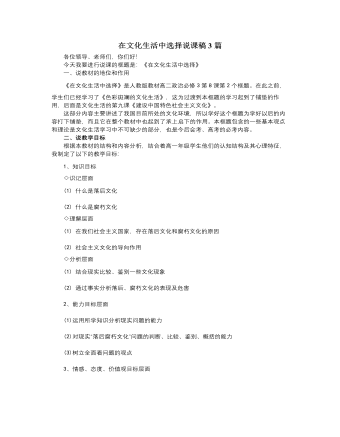
人教版高中政治必修3在文化生活中选择说课稿3篇
生2:每逢清明,或其他一些死者的纪念日,人们总要为死去的亲人烧纸钱。这幅漫画由烧纸钱演变为烧“家电”,说明随着社会环境的变化,人们根深蒂固的一些封建思想,还在影响着人们的生活。要花大力气去破除封建迷信活动。师:说到底,算命、烧纸钱是封建迷信活动,从文化角度来说,是落后文化。我们一起来看看在现实生活中,还有哪些落后文化在影响着人们的生活。生1:在一些边远落后地区,大人小孩生了病,不是看医生,而是让巫婆神汉来治,结果往往耽误了诊疗时间,有的甚至还丢掉了性命。生2:“重男轻女”“多子多福”,红白事大操大办现象在有些地方还很严重。师:这些落后文化都有哪些共同特征?在你看来,这些现象有哪些危害?生3:这些落后文化,在内容上带有迷信、愚昧、颓废、庸俗等色彩,在形式上常常以传统习俗的形式表现出来,如人们常见的看相、算命、测字、看风水等。它会麻痹人的意志,使人消极、悲观、绝望,对理想、前途、信念丧失信心;破坏社会的风气。
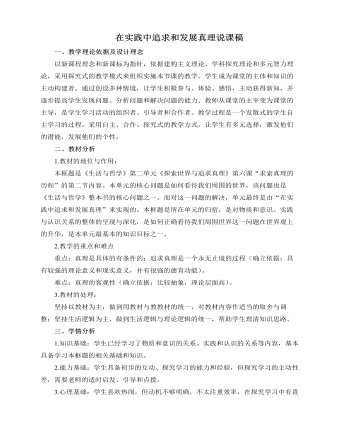
人教版高中政治必修4在实践中追求和发展真理说课稿(二)
一、教学理论依据及设计理念以新课程理念和新课标为指针,依据建构主义理论、学科探究理论和多元智力理论,采用探究式的教学模式来组织实施本节课的教学。学生成为课堂的主体和知识的主动构建者。通过创设多种情境,让学生积极参与、体验、感悟,主动获得新知,并逐步提高学生发现问题、分析问题和解决问题的能力。教师从课堂的主宰变为课堂的主导,是学生学习活动的组织者、引导者和合作者。教学过程是一个发散式的学生自主学习的过程。采用自主、合作、探究式的教学方式,让学生有多元选择,激发他们的潜能,发展他们的个性。二、教材分析1.教材的地位与作用:本框题是《生活与哲学》第二单元《探索世界与追求真理》第六课“求索真理的历程”的第二节内容。本单元的核心问题是如何看待我们周围的世界,该问题也是《生活与哲学》整本书的核心问题之一。
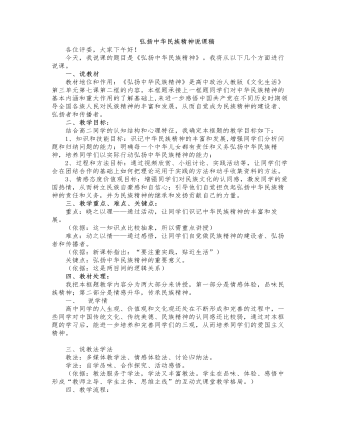
人教版高中政治必修3弘扬中华民族精神说课稿
3、评:以评促行。(6分钟)高中生的年龄特点决定了他们非常重视别人对自己的评价,渴望得到他人的肯定与鼓励。(所以我在班上组织一个活动:让同学们评选出班上“讲文明懂礼貌的文明之星”、“勤思考善创新的学习之星”(先让同学推举大家都认同的4位同学,然后对他们进行投票,投票结果将在下堂课上公布)以此活动来激发同学们用实际行动做民族精神的践行者和传播者。)4、唱:以情激行。(2分钟)在课程内容讲授结完毕后,组织全班同学跟着音乐高唱孙楠的《红旗飘飘》,生化情感,激发同学们的爱国情感。五、课堂拓展(请同学们各展才华:课后让同学们各自准备一个项目以体现民族精神。(项目形式是:或作文、书画;或剪纸、或歌曲小品)……让同学们用实际行动祝愿我们伟大的祖国更加繁荣昌盛!让我们的民族精神代代相传!)
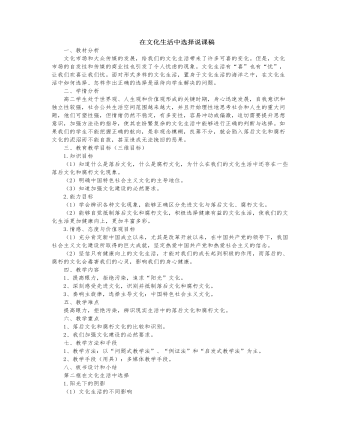
人教版高中政治必修3在文化生活中选择说课稿
一、教材分析文化市场和大众传媒的发展,给我们的文化生活带来了许多可喜的变化。但是,文化市场的自发性和传媒的商业性也引发了令人忧虑的现象。文化生活有“喜”也有“忧”,让我们欢喜让我们忧。面对形式多样的文化生活,置身于文化生活的海洋之中,在文化生活中如何选择、怎样作出正确的选择是亟待向学生解决的问题。二、学情分析高二学生处于世界观、人生观和价值观形成的关键时期,身心迅速发展,自我意识和独立性较强,社会公共生活空间范围越来越大,并且开始理性地思考社会和人生的重大问题,他们可塑性强,但情绪仍然不稳定,有多变性,容易冲动或偏激,迫切需要提升思想意识,加强方法论的指导,使其在纷繁复杂的文化生活中能够进行正确的判断与选择。如果我们的学生不能把握正确的航向,是非观念模糊,良莠不分,就会陷入落后文化和腐朽文化的泥沼而不能自拔,甚至造成无法挽回的恶果。
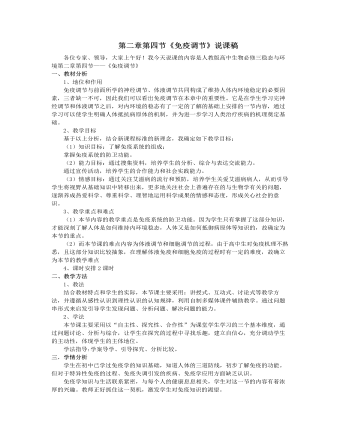
人教版高中生物必修3第二章第四节《免疫调节》说课稿
(四)、活动交流,体验科学通过资料分析讨论以下三个问题:1、你知道爱滋病的传播途径吗?2、如何预防爱滋病?3、我们应如何对待爱滋病患者?面对艾滋病我们能做些什么?从而进入情感态度的教育。除此之外,我还设计一个开放性的作业“向全社会为关注艾滋病设计一个宣传广告”(形式不限,漫画、板书、倡议书等),让学生把爱心付诸于实际行动。在此基础上引出“免疫学的应用”从免疫预防、免疫治疗、器官移植三个方面讲述,让学生充分体验到知识和社会生活的紧密联系,让他们不在感到科学是那么的遥远,而是可爱的有用的。通过交流,让同学们体会到合作的魅力和重要性,进一步培养合作意识和合作能力。最后我设计一个资料搜集,让同学们选一个感兴趣的主题利用电脑在网上搜集有关资料。主题:1、你知道世界艾滋病日吗?历年的主题是什么?开展世界艾滋病运动有什么意义?
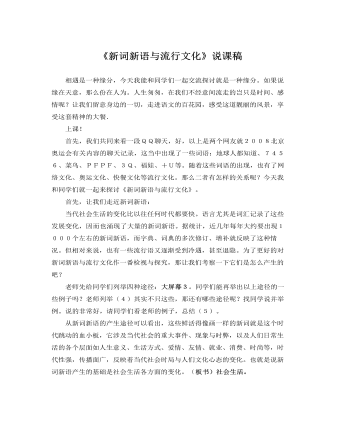
人教版高中语文必修1《新词新语与流行文化》说课稿
当代社会生活的变化比以往任何时代都要快。语言尤其是词汇记录了这些发展变化,因而也涌现了大量的新词新语。据统计,近几年每年大约要出现1000个左右的新词新语,而字典、词典的多次修订、增补就反映了这种情况。但相对来说,也有一些流行语又逐渐受到冷遇,甚至退隐。为了更好的对新词新语与流行文化作一番检视与探究,那让我们考察一下它们是怎么产生的吧?老师先给同学们列举四种途径:大屏幕3。同学们能再举出以上途径的一些例子吗?老师列举(4)其实不只这些,那还有哪些途径呢?找同学说并举例。说的非常好,请同学们看老师的例子,总结(5)。从新词新语的产生途径可以看出,这些鲜活得像画一样的新词就是这个时代跳动的血小板,它涉及当代社会的重大事件、现象与时弊,以及人们日常生活的各个层面如人生意义、生活方式、爱情、友情、就业、消费、时尚等,时代性强,传播面广,反映着当代社会时局与人们文化心态的变化。
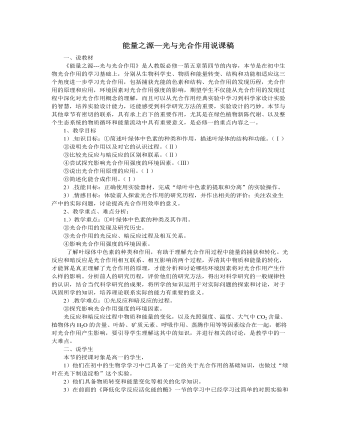
人教版高中生物必修1能量之源—光与光合作用说课稿
1)他们在初中的生物学学习中已具备了一定的关于光合作用的基础知识,也做过“绿叶在光下制造淀粉”这个实验。2)他们具备物质转变和能量变化等相关的化学知识。3)在前面的《降低化学反应活化能的酶》一节的学习中已经学习过简单的对照实验和相关的实验设计原则,使本节课最后的实验设计得以顺利进行。4)他们具有一定的 分析问题的能力,实施问题探究教学是可行的。三、教法和学法根据上述对教材和学生的分析,本节采用以下教法和学法:1)实验法:以实验说明结论。生物学的教学就是实验的教学过程,实验的展示形式有学生分组实验、老师示范实验、动画和图片演示实验等,让实验现象说明问题,而不是直接让学生记住结论。2)问题探究教学发:以问题引发兴趣。整个教学过程要设置好问题,层层展开,层层递进,让新知识与旧知识融为一个整体,让学生在步步上升中攀登到知识的顶峰。3)比较学习法,同时采用多媒体辅助教学,解决光合作用抽象的过程。
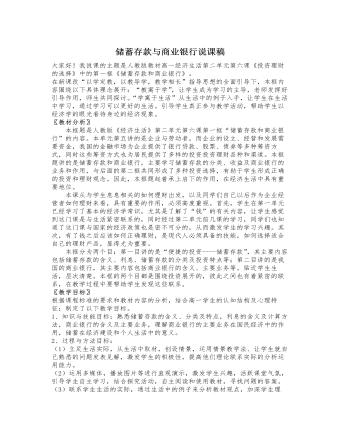
人教版高中政治必修1储蓄存款与商业银行说课稿
(一)储蓄存款1、储蓄存款的含义:讲解时让学生明白几个要点----谁在存?存什么?往哪存?有什么凭证?为什么存?并强调居民存款必须是合法拥有的,而且是有偿的。明确含义之后通过案例引导学生思考,人们都到哪些地方存款?学生活动:可以存入农业银行、建设银行、中国银行、工商银行信用合作社,邮政储蓄等;2、通过学生回答,我国的主要储蓄机构是各商业银行,并引导学生思考人们为什么将钱存入储蓄机构?储蓄的目的是什么?(可获得利息)从而引出3、利息含义及其计算公式,并熟悉利息计算公式4、提出问题:储蓄种类----定期,活期,让学生对比两种储蓄的异同并填表格。(二)我国的商业银行首先展示一组银行图标引导学生思考,哪些银行属于商业银行,从而引出第一个小问题----商业银行的含义。讲解定义,让学生抓住商业银行的业务和经营目标。
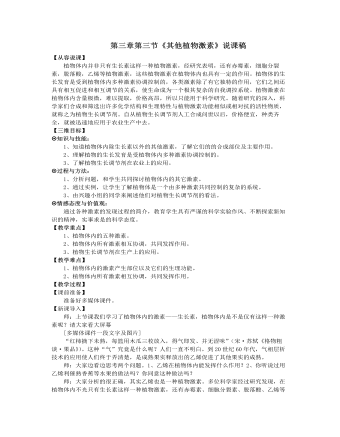
人教版高中生物必修3第三章第三节《其他植物激素》说课稿
二、应用生长调节剂的注意事项1、效果不稳定。2、使用时期。3、使用浓度和方法。4、使用生长调节剂仅是葡萄栽培管理的辅助手段,不能盲目孤立地依赖生长调节剂。生2:我们小组查的资料是关于小麦使用生长调节剂。小麦应用植物生长调节剂,可以调节植株的生长发育,具有控旺促壮、增强抗逆性、增加粒重、提高产量并有利于优质、早熟等多重效果。生3:我找了一篇生长调节剂对矮牵牛大型穴盘生产。师:上面三位同学利用课下的时间,在网上查的三段文字都相当的不错,大家可以从中学到一些书本上没有的知识,请大家结合刚刚三位同学的三段文字以及自己平时所积累的知识,讨论以下几个问题。师:你知道哪些农产品在生产过程中使用了植物生长调节剂?师:哪些水果在上市前有可能使用了乙烯利?师:生产过程中施用植物生长调节剂,会不会影响农产品的品质?师:如果你是水果销售员,面对半青不熟的水果,你认为应当使用乙烯利催熟吗?作为一个消费者,你又怎么看?
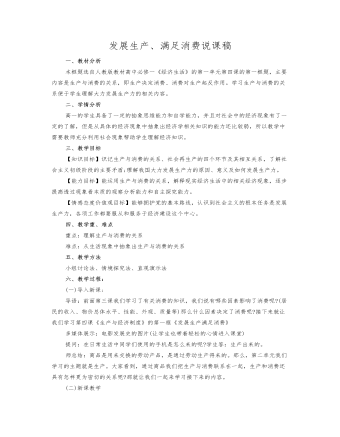
人教版高中政治必修1发展生产-满足消费说课稿
(2)多媒体展示:消费者们反映iPhone4的500万像素太不给力,3,5英寸的屏幕太小,促使苹果公司给新一代iPhone装上了一颗800万像素的摄像头4,0英寸的屏幕等,发展到最新的一代iPhone6plus已经达到5.5英寸。师:新一代iphone更新的驱动力是什么呢?其实新产品的升级对于苹果公司来说经费投入不小但是不经过升级换代产品就不能满足消费者的新的消费要求,所以消费者的反应客观上促进了iphone的升级换代——消费对生产的调整与升级起着导向作用(3)多媒体展示:随着网购迅猛的发展,快递、仓储业务等也出现爆发式增长。这一现象说明了什么?(举例:iPhone在全球市场的火热,“壳”文化产业第一个进入人们的视线,随着时间的发展,外壳的产业飞速蓬勃的发展着)结论:一个新的消费热点的出现往往能带动一个或多个产业的出现和成长。消费所形成的新的需求对生产的调整和升级起着导向作用,需求的数量和质量调节供给的数量和质量。
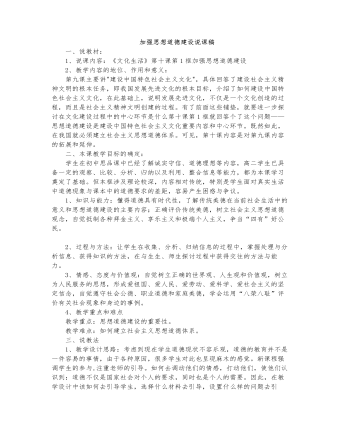
人教版高中政治必修3加强思想道德建设说课稿
【讨论】只要继承和弘扬中国传统文化中传统美德,就可以构建思想道德体系。学生展示:法律中道德规范。老师展示:法治:以法律的权威性和强制性规范社会成员的行为(外律)。德治:以道德的说服力和感召力提高社会成员的思想认识和道德觉悟(内律)。结论:既要加强社会主义法制建设,依法治国;也要继承、发展、创新传统美德,加强思想道德建设,以德治国。建立社会主义思想道德体系要与法律法规相协调。设计意图:设计一个条件型辨析探究题开展讨论,把建设思想道德与优秀传统文竹也、法治的关系结合起来,把课堂探究与课前探究结合起来,有利于提高学生的思维能力和课堂教学效率。践行:思想道德建设从我做起你是否认同、选择下列行为?展示校园现象图片《作弊》与《小烟民》(略);展示中学生在家中表现的漫画《老子、儿子和孙子》(略);
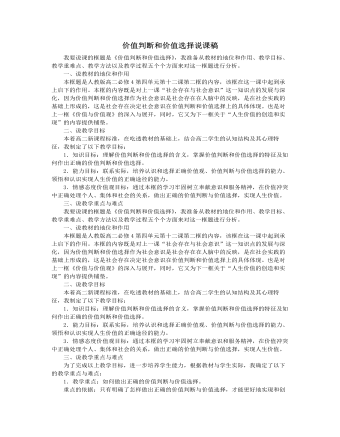
人教版高中政治必修4价值判断和价值选择说课稿(一)
2.讲授新课:(约35分钟)结合教材内容重难点和学生实际,在讲课过程中,我对教材内容的顺序进行了重组,把教材内容由原来的两大部分划分为三大部分(第一,价值判断和价值选择的含义和关系;第二,价值判断和价值选择的特征;第三,做出正确的价值判断和价值选择的标准)。这一调整更符合学生的认知结构,便于从整体上把握课本内容。在讲授过程中,我充分利用课本素材——探究活动为课堂教学服务,此外,利用学生的生活与体验,挖掘实例,如结婚要礼由以前的旧三件到现如今的转变,引导学生理解价值判断和价值选择的社会历史性特征,以以《观祈雨》、以医生、艺术家、老学究对于《断臂的维纳斯》这个雕塑的不同见解、以新鲜实例韩国沉船事件和范跑跑为例启发学生价值判断和价值选择具有主体差异性特征以此突破难点,最后通过设疑、对比、追问正确的价值判断和价值选择的标准来深化主题,突出重点。3.课堂小结:(约2分钟)强化认识